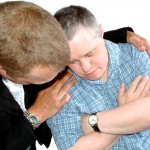John Northfield
After qualifying as a social worker, John worked in community learning disability teams before getting involved in a number of long-stay hospital closure programmes, working to develop individual plans for people moving into their own homes. He worked for BILD, helping to develop the Quality Network and was editorial lead for the NHS electronic library learning disabilities specialist collection. This led him to found the Learning Disabilities Elf site with Andre Tomlin as a way of making the evidence accessible to practitioners in health and social care. Most recently he has worked as part of Mencap's national quality team and also been involved in a number of national website developments, including the General Medical Council's learning disabilities site.











